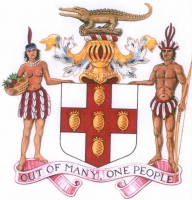Jamaica- Second National Communication
Project Overview
The creation of a National Communication offers countries the opportunity to contribute with technically sound studies and information that can be used for designing mitigation and adaptation measures, and project proposals that can and will help increase their resilience to the impacts of climate change. Activities generally include: V&A assessments, Greenhouse Gas Inventory preparation, Mitigation Analysis or Education, and awareness raising activities.The ultimate goal is the integration of climate change considerations into relevant social, economic and environmental policies and actions.
Key vulnarabilities identified in Jamaica's Second National Communication (2011):
- Water Resources
- Agriculture and food security
- Public Health
- Costal Resources and Human Settlement
- Tourism
Project Details
Water Resources
- Increasing and maintaining investment in hydrological monitoring and water use through a national database. This will result in improved data collection and storage on a national scale.
- Funding research into adopting a water resources and water supply planning method under climate change. With appropriate methods in place, consistent regional and national planning can take place under a changing climate.
- Developing appropriate modelling tools to assist strategic planning of water resources. There is an urgent need to develop a consistent set of appropriate modelling approaches and tools.
- Investigate shifting focus from ground water to surface water storage for water supply. Reducing the reliance on vulnerable coastal aquifers, in terms of quality and quantity with the increased use of surface water reservoirs to maintain supplies.
Agriculture and food security
- Raise awareness of the potential impact of climate change on the agricultural sector. Climate change is not mentioned in the Agricultural Development Strategy 2005‐2008.
- Develop modelling approaches and tools to allow assessment of impacts of climate change on export and domestic crops and meat production. Detailed crop/country/climate specific assessments are required to inform an adaptation programme and policy development.
- Develop regional links to fund and promote plant breeding programmes for common crops. Adaptation strategies include the development of crop varieties with increased temperature, drought and pest resistance.
- Review approaches to integrated pest management under climate change. Existing pest management strategies may require modification under climate change. Care must be taken that any changes to these strategies do not have negative impacts on the environment, for example, from increased pesticide use.
Public Health
Short‐term adaptation strategies for addressing vector‐borne diseases include:
- Public education aimed at encouraging individuals to identify and eliminate current breeding sites and the symptoms of dengue;
- Surveillance in outbreak communities for the purpose of environmental sanitisation; and
- Adult mosquito control through the use of appropriate insecticide.
Priority should be given to:
- Better water monitoring and management through improvements at the National Water Commission and Water Resources Authority;
- Improving the capabilities of ODPEM to warn of hazards;
- Improving data gathering ability and technical support staff of the Meteorological Office for monitoring and warning of air‐boned type diseases;
- More collaboration between research institutions involved in pollution control;
- All available climate data from sources are to be used to validate regional models and calibrate statistical models;
- Support should be given to research institutions involved in environmental related health risks to run as many regional and statistical downscaling models as possible for calibration and intercomparison purposes
Costal Resources and Human Settlement
- The most important measure for adapting to sea‐level rise involves a thorough revision of the present published setback guidelines. Instead of being based on slope angles, these should be related to the local risk of inundation from present and future storm events (i.e., site specific).
- The vulnerability of communities such as Portmore to extreme weather events and the susceptibility of escape roads to flooding require a major effort to re‐engineer the Mandela Highway and other arterial roads at low elevation as all‐weather highways.
- There will be an increasing need for beach nourishment projects for carbonate beaches.
- Future research needs include an island‐wide estimation of vulnerability to storms and sea‐level rise (i.e., a modified CVI) to provide the technical background for decision making for coastal development proposals.
Tourism
- Raise stakeholder awareness of the workings of both tourism and environment;
- Stakeholder identification of detailed programme and projects;
- Set up a comprehensive performance framework with targets;
- Provide more varied visitor attractions to a) put less pressure on existing natural resources and b) stimulate more visitors;
- Reflect social and environmental costs in the price of tourism products;
- Improve environmental lobbying;
- Implement infrastructural changes to protect the environment, e.g., groynes and levees, reforestation, and coastal zone management;
- Implement education and sensitisation programmes;
- Intensify community tourism activities; and
- Increase urban tourism.
Key Results and Outputs
- Sustainable development and the integration of climate change concerns into medium- and long-term planning
- Inventories of anthropogenic emissions by sources and removals by sinks of greenhouse gases
- Measures contributing to addressing climate change
- Research and systematic observation
- Climate change impacts, adaptation measures and response strategies
- Education, training and public awareness
Reports and Publications
Assessments and Background Documents
Monitoring and Evaluation
In 1992, countries joined an international treaty, the United Nations Framework Convention on Climate Change, to cooperatively consider what they could do to limit average global temperature increases and the resulting climate change, and to cope with whatever impacts were, by then, inevitable.
Parties to the Convention must submit national reports on implementation of the Convention to the Conference of the Parties (COP). The required contents of national communications and the timetable for their submission are different for Annex I and non-Annex I Parties. This is in accordance with the principle of "common but differentiated responsibilities" enshrined in the Convention.
The core elements of the national communications for both Annex I and non-Annex I Parties are information on emissions and removals of greenhouse gases (GHGs) and details of the activities a Party has undertaken to implement the Convention. National communications usually contain information on national circumstances, vulnerability assessment, financial resources and transfer of technology, and education, training and public awareness.
Since 1994, governments have invested significant time and resources in the preparation, collection and validation of data on GHG emissions, and the COP has made determined efforts to improve the quality and consistency of the data, which are ensured by established guidelines for reporting. Non-Annex I Parties receive financial and technical assistance in preparing their national communications, facilitated by the UNFCCC secretariat.



